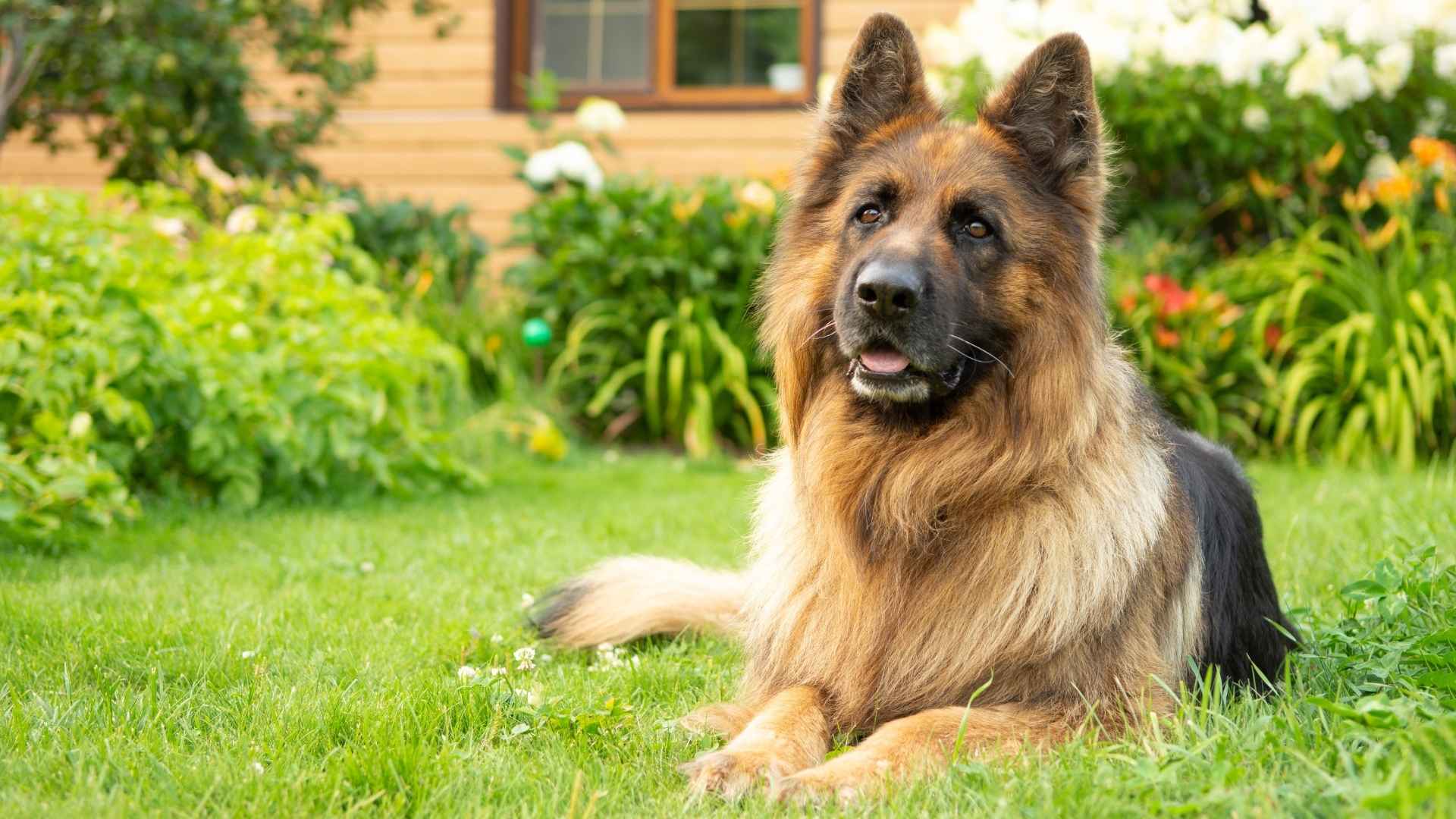Got a big backyard just begging for a four-legged friend to rule the roost? If you’ve got more space, why not go all-in with a dog that actually needs that kind of room to roam? We’re talking about the kind of pups that love to stretch their legs, sprint full-speed into the wind, and claim every inch of your yard like it’s their kingdom.
These aren’t the types that are happy lounging around all day. Nope—these big boys and girls thrive on movement, mental stimulation, and a whole lot of room to just be their goofy, adventurous selves. Sounds like a match for your wide-open space?
But not every large dog is built the same—some are couch potatoes in disguise, while others were practically born to zoom around the yard. So, which ones will actually use all that space you’re offering? Let’s dive in and find out who truly belongs in that big backyard of yours.
Big Dog Breeds for Spacious Yards
1. Weimaraner
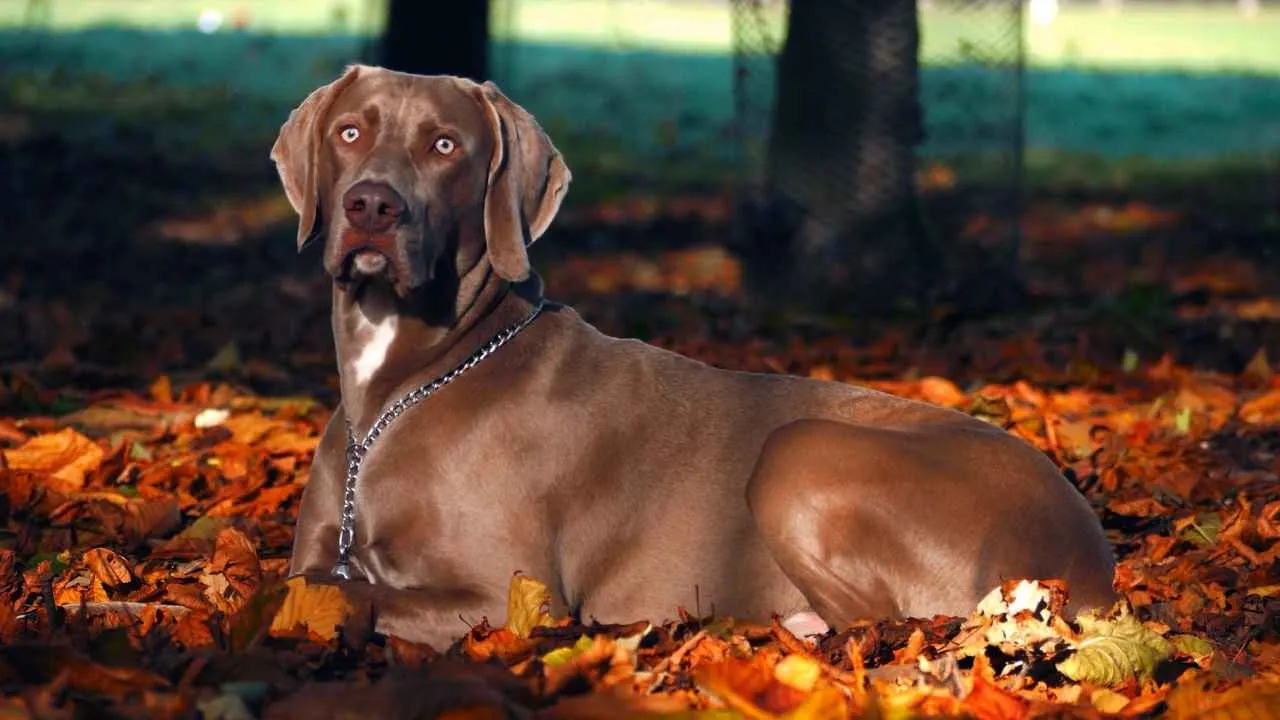
The Weimaraner is sleek, athletic, and built for action—definitely not a couch potato kind of dog. These energetic powerhouses need a big backyard like fish need water. A cramped apartment? Nope, that just won’t cut it. They’re happiest when they have space to run, chase, and burn off their never-ending energy through regular exercise.
Originally bred for hunting big game, Weimaraners are wired for stamina and speed. That strong prey drive hasn’t gone anywhere either—they’ll still chase birds, squirrels, and pretty much anything that moves. So, a fenced yard isn’t just nice—it’s essential. Ever seen a dog bolt like lightning? That’s a Weim.
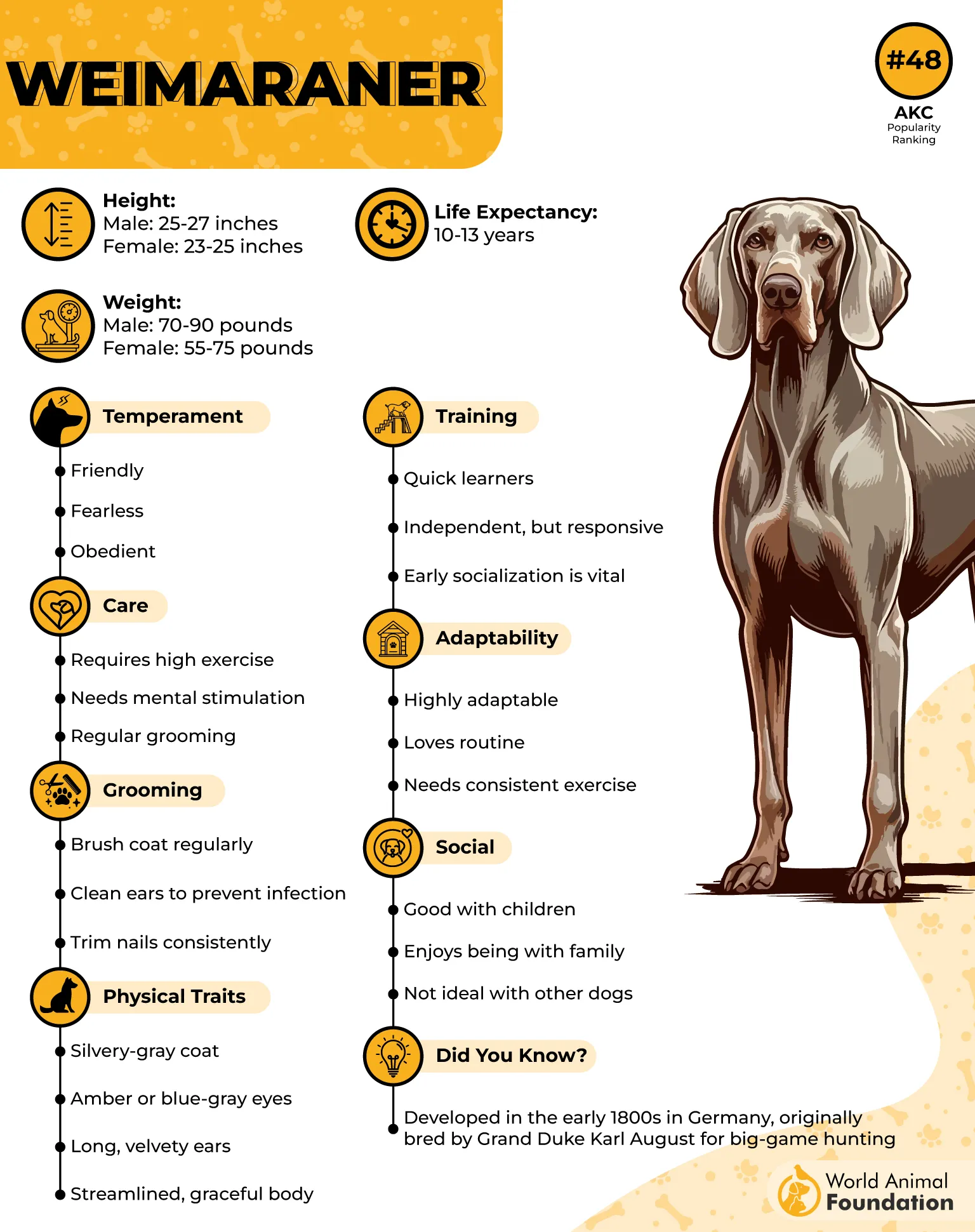
What really sets them apart is their intense loyalty. These dogs form deep bonds with their people and don’t like being left alone for too long. Ever heard of a “Velcro dog”? That’s a Weimaraner. They’ll follow you from room to room like your own personal shadow.
Their short, sleek coats make them low-maintenance in the grooming department, but they’re also not low-effort dogs. Daily exercise is non-negotiable, and they need plenty of space to burn steam. A big yard isn’t just ideal—it’s practically mandatory with this breed.
They’re not big barkers, but they are very alert, says AKC. Their natural instincts make them solid watchdogs. They’ll notice anything unusual in the yard—and let you know about it. Not bad if you’re looking for a protective pal without the constant noise.
Fun fact: Weimaraners were nicknamed the “Gray Ghost” for their spooky-fast speed and silvery coats. In low light, they can almost vanish in a blink—no magic involved, just pure athleticism.
2. Rottweiler
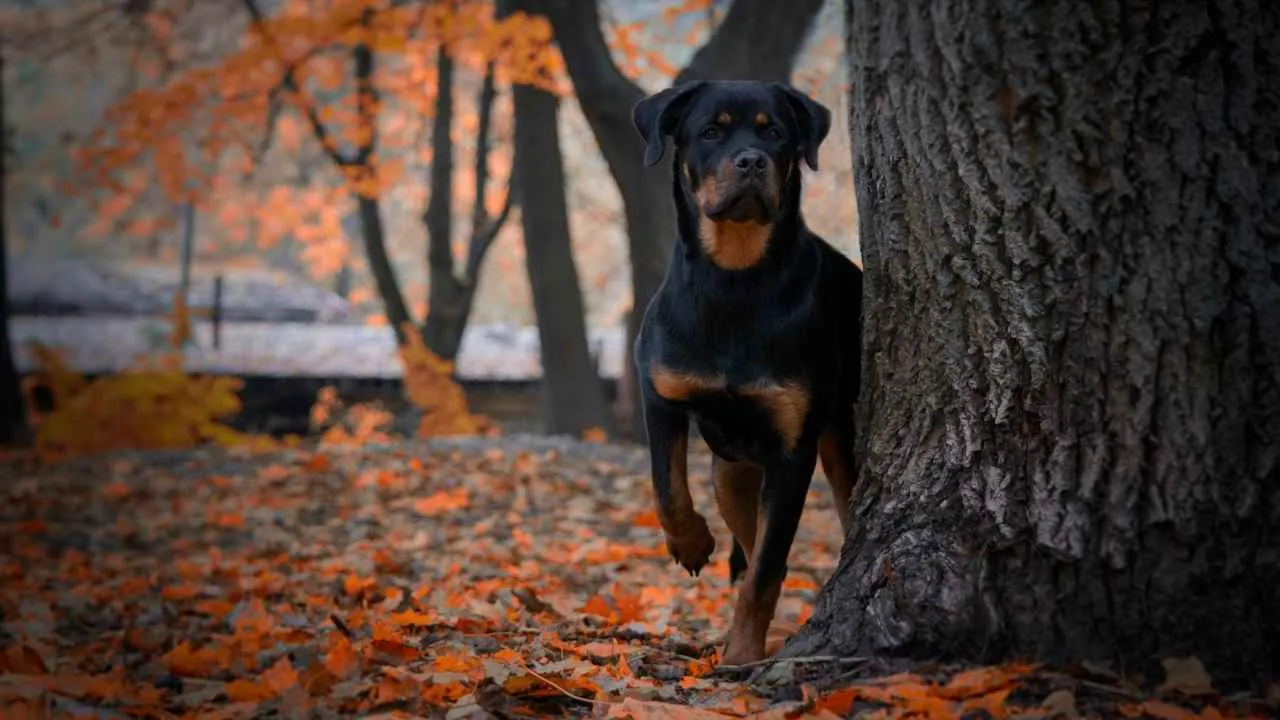
Rottweilers are bold, confident, and built like tanks. They thrive in environments where they can roam freely without being boxed in. A small yard? Forget it. This large breed needs room to stretch those powerful legs and patrol their turf like it’s Fort Knox.
Despite their strong and tough exterior, Rottweilers are surprisingly affectionate with their people. They love being close to their families and can be real softies once they trust you. But don’t mistake loyalty for laziness—this breed needs daily physical and mental challenges.
They’re natural-born workers, originally bred for herding and pulling carts. So, what happens when you keep them cooped up too long? They’ll find a job for themselves, like landscaping your lawn or redesigning your patio furniture. A spacious yard lets them burn that working dog energy constructively.
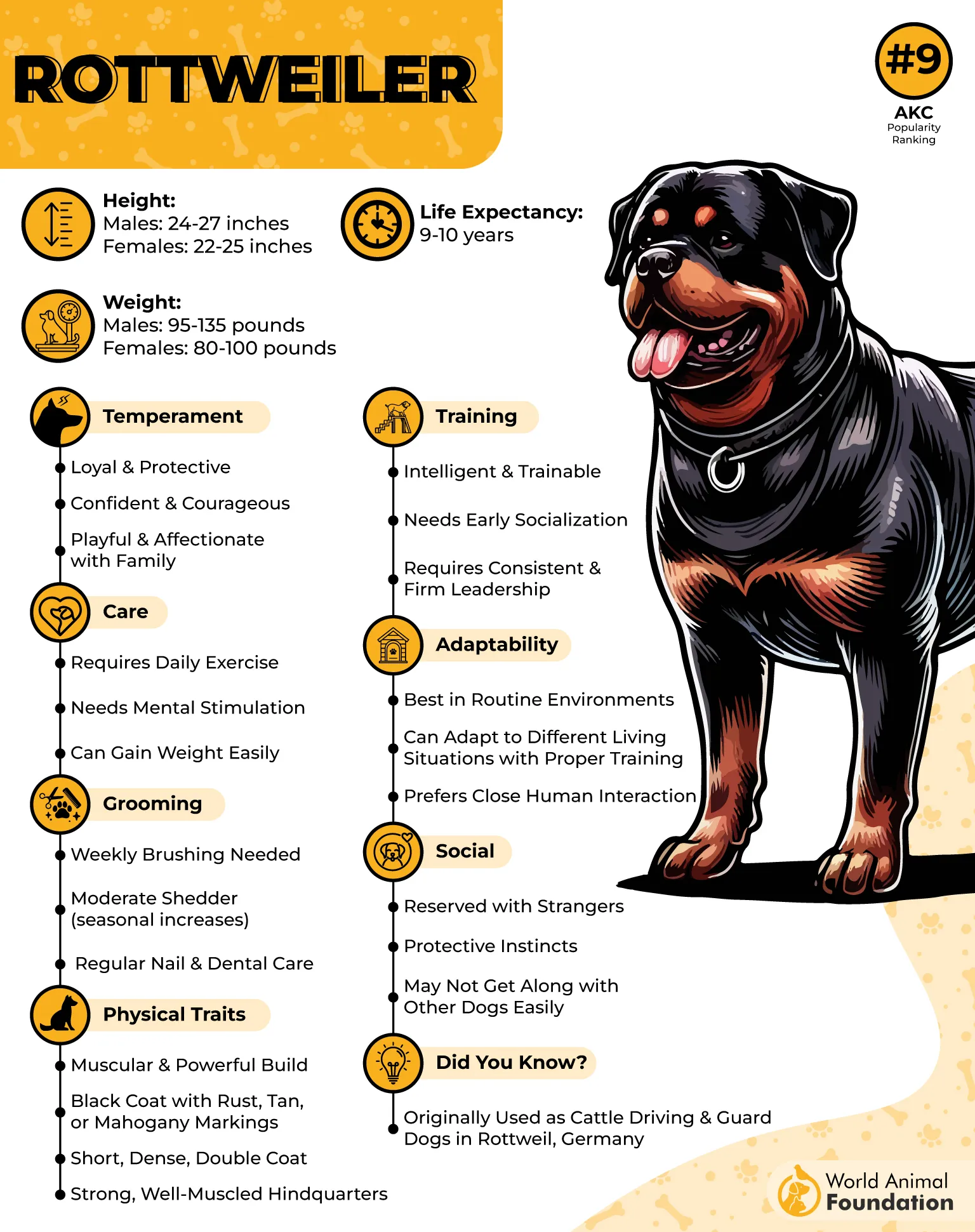
Training a Rottweiler is all about confidence and consistency. These dogs are whip-smart and love learning, but they don’t respond well to harsh treatment. Start early, use positive reinforcement, and you’ll end up with a calm, obedient powerhouse of a dog.
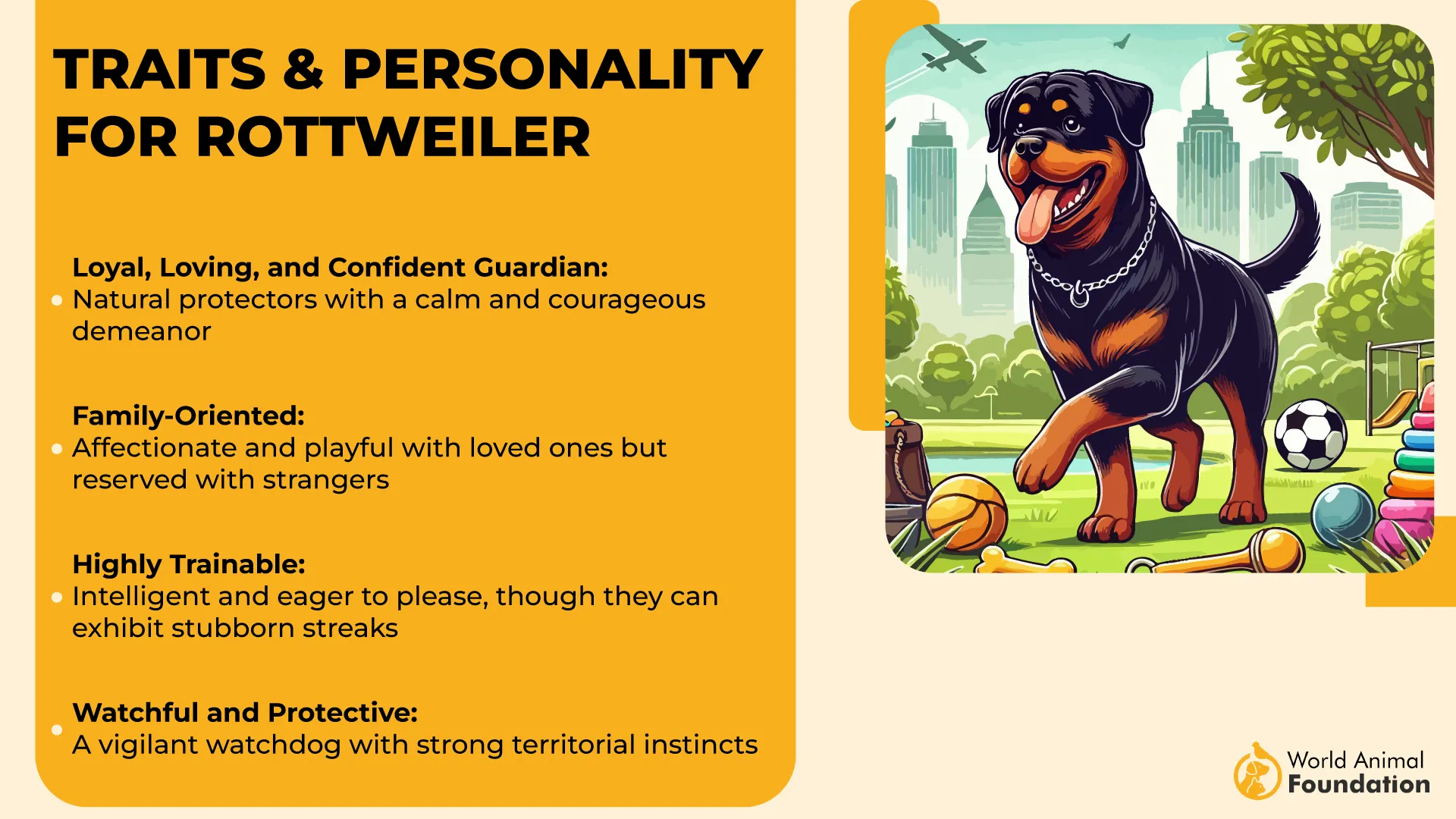
Their short, glossy coat doesn’t need much upkeep, but their joints do. Rottweilers can be prone to hip or elbow issues, so regular movement in a large yard helps keep them fit. Add in a balanced diet and controlled exercise, and you’ve got a healthy, happy dog.
3. Doberman Pinscher
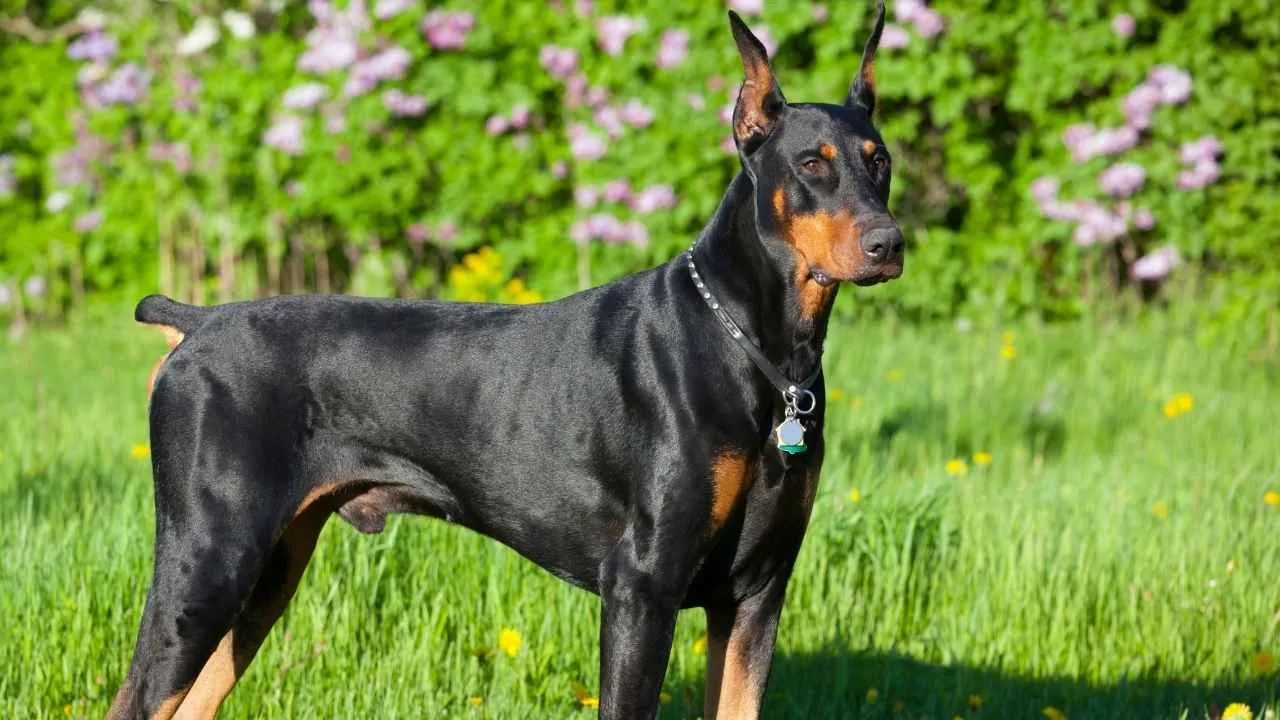
The Doberman Pinscher is a striking blend of elegance, power, and intelligence. With their sleek coat and muscular build, they’re a sight to behold, and their high energy means they need plenty of space to burn it all off. A large yard gives them the freedom they need to be active and alert, which is in their DNA as natural guardians.
Originally bred for protection, Dobermans are known for their sharp instincts and unwavering loyalty. They’re not just watchdogs—they’re protectors, and their keen senses make them excellent at sensing threats. They’re a perfect fit for those who need a vigilant, protective dog who can patrol large areas with ease.
While they may seem intimidating to strangers, they’re usually calm and collected around their own family. Their loyalty and protective nature mean they’re always looking out for their people. But don’t think they’re all business—they have a playful side too, especially in wide open spaces where they can run and explore.
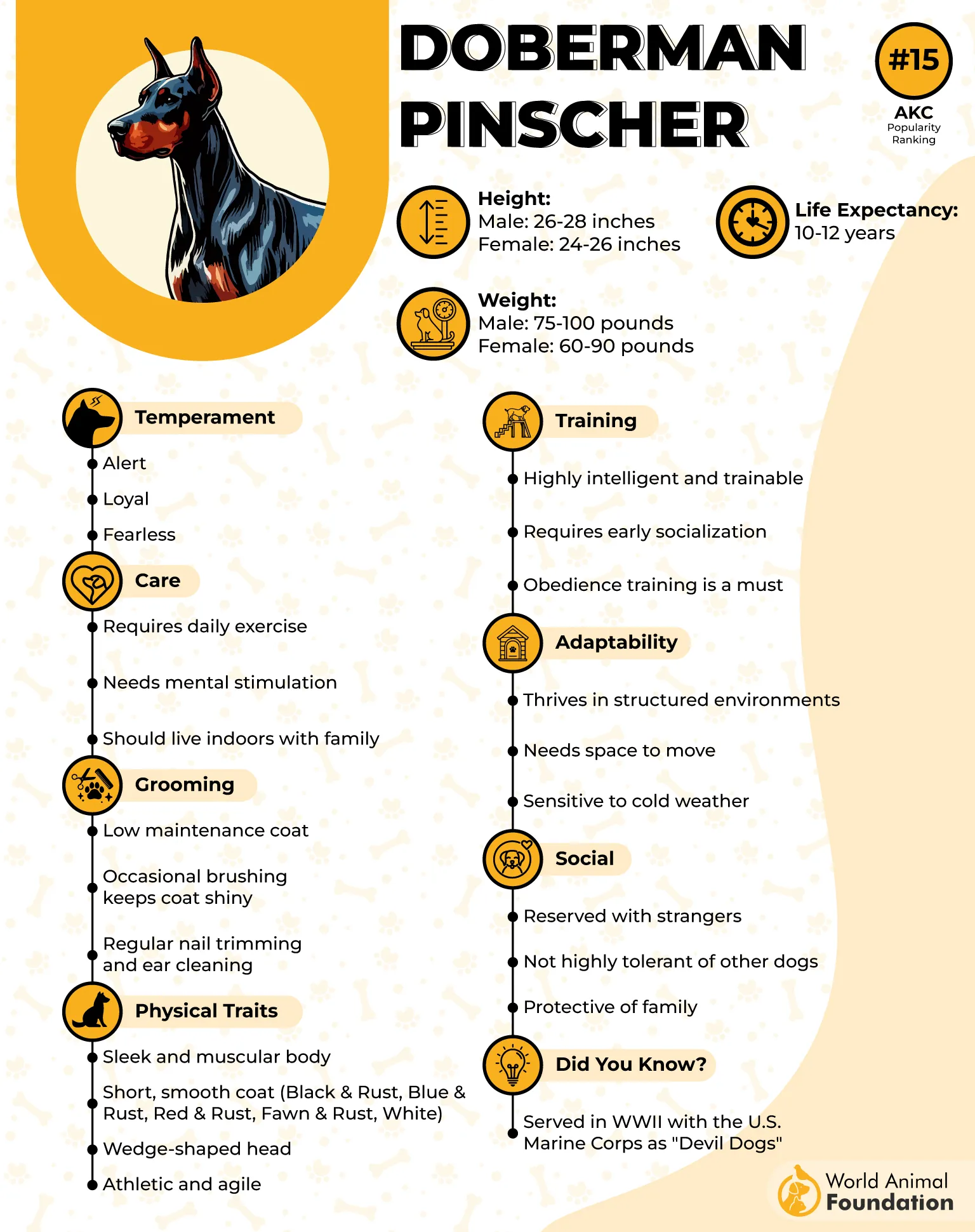
Dobermans are athletic dogs with a high drive, so they’re always up for activities like fetch, agility training, or obedience drills. A spacious yard is a perfect spot to engage them in these kinds of activities. It’s important to give them the chance to channel their energy into something productive—otherwise, they might find their own entertainment.
While Dobermans are known for their speed and agility, they are also prone to certain health issues, especially heart problems like dilated cardiomyopathy. Keeping them fit with regular exercise in a spacious yard can help manage their health and ensure a long, active life. Always stay on top of vet check-ups to keep them in tip-top shape.
4. Bloodhound
Bloodhounds are world-class sniffers, and their super-powered noses are what make them legendary. These dogs are known for their remarkable tracking ability, which makes them excellent working dogs. While they might not be the fastest runners, they more than make up for it with their persistence and ability to cover vast areas.
These dogs are often seen in search-and-rescue operations due to their unmatched scent-tracking skills. When they’re not on the clock, though, they love to roam and explore. A spacious yard allows them to stretch their legs and follow their instincts without feeling restricted, making them happy and content.
PDSA states that Bloodhounds are also affectionate dogs and loyal companions. They form strong bonds with their families and are known for being gentle with children and other pets. However, their independent nature means they can sometimes be a bit stubborn during training, so a firm but patient approach works best with them.
Bloodhounds need daily mental stimulation to keep them from getting bored, which can lead to trouble. A large yard is an ideal place for scent games, and you can even set up a scavenger hunt to engage their tracking instincts. Keeping them busy with tasks that use their sense of smell will prevent them from becoming destructive.
Bloodhounds are typically good-natured dogs that aren’t overly aggressive. They do best in environments where they have space to explore and are given tasks that allow them to use their extraordinary tracking skills. If you’ve got a big yard, they’ll happily patrol it, using their nose to detect every new scent in their territory.
5. Beauceron
The Beauceron is a strong, agile, and intelligent breed, known for its herding and guarding abilities. These dogs are built for action and thrive in environments where they can roam freely. A spacious yard is essential for this breed, as they love having room to run, explore, and burn off their abundant energy.
Originally bred in France as a working dog, Beaucerons were used to herd livestock and protect flocks from predators. Their natural instincts make them excellent guardians, and they take their job seriously. A large yard allows them to patrol their territory and ensure that everything is in order, which is exactly what they were bred to do.
This breed is also known for its versatility. Not only can they excel in herding and guarding, but Beaucerons are also skilled in various dog sports. Whether it’s obedience, agility, or even search and rescue, these dogs thrive on mental and physical challenges. A large yard gives them the perfect space to practice their skills and stay engaged.
While they’re not particularly high-maintenance when it comes to grooming, Beaucerons do shed moderately, so regular brushing helps keep their coat healthy. VCA states that they’re generally quite clean and have a short coat that dries quickly, so after a good run in the yard, you won’t need to spend too much time cleaning them up.
Beaucerons are not the best fit for first-time dog owners because of their strong will and need for a structured environment. However, experienced dog owners who can provide consistent training, plenty of physical and mental stimulation, and a large yard for them to explore will find the Beauceron to be a loyal and loving companion.
6. German Shepherd
German Shepherds are one of the most versatile and intelligent breeds out there. Originally bred as herders, these dogs are packed with energy and purpose. They excel in nearly every field of work, from police and military to search and rescue.
While they’re known for their work ethic, German Shepherds are also incredibly loyal family dogs. They bond closely with their human pack and are fiercely protective of their loved ones. This makes them excellent guardians, but their loyalty doesn’t mean they’re standoffish.
German Shepherds thrive on having a job to do, which is why a spacious yard can be such an asset. These dogs are not content with simple play—they want tasks that challenge their minds and bodies. Whether it’s a game of fetch, an agility course, or a scent-tracking challenge, they’ll excel in an environment that provides physical and mental stimulation.
Though they can be friendly with other pets, early socialization is essential for a German Shepherd. They can be reserved with strangers, which makes them fantastic watchdogs, but also means they need proper introductions to new people and environments.
These dogs aren’t just brawn—they’re also brainy. A German Shepherd’s ability to think on its feet is why it’s used in such demanding roles. Whether they’re working alongside law enforcement or guiding the blind, their ability to process commands and react quickly makes them a prized companion.
7. Bernese Mountain Dog
The Bernese Mountain Dog is a stunning, large breed with a calm and laid-back nature, making them perfect for those with spacious yards. Originally bred to work in the Swiss Alps, they’re used to wide, open spaces where they can roam freely and carry out tasks like pulling carts and herding livestock.
These gentle giants are known for their affectionate and friendly demeanor. They love being around their family, often following their people from room to room. Despite their imposing size, Bernese Mountain Dogs are surprisingly sweet and patient, especially with children, making them great companions for families with plenty of outdoor space.
Due to their history as working dogs, Bernese Mountain Dogs are strong, sturdy, and have an enduring work ethic, says WebMD. However, their work tends to be less about high-energy tasks and more about steady, dependable help. With a large yard, you’ll see them happily engage in activities that require moderate effort, like pulling a cart for fun or simply exploring their territory.
Although Bernese Mountain Dogs are incredibly affectionate, they can also be quite reserved around strangers. They are naturally protective of their family but won’t usually show aggression unless they feel threatened. This makes them great watchdogs in a large yard, where they can keep an eye on everything happening around them.
While they are calm and content, Bernese Mountain Dogs are not meant to be left alone for long periods of time. They thrive in an environment where they can interact with their family and be included in daily activities. A spacious yard, along with plenty of attention and time outdoors, will keep them happy and secure.
8. Cane Corso
The Cane Corso is a powerful, confident breed with a natural instinct to protect its family and territory. With their imposing size and muscular frame, they need a spacious yard to move around and express their strength. This breed was originally used for guarding and working alongside farmers, which means they thrive when given space to patrol and keep watch.
These dogs are highly intelligent and responsive to training, but they need a firm, consistent handler. If you’re someone who is experienced in working with large, protective dogs, the Cane Corso will quickly bond with you. A spacious yard allows you to engage them in obedience training, agility, or just regular exercise, helping them stay mentally and physically active.
Although they are generally calm, Cane Corsos are alert and watchful, making them excellent guard dogs, states Purina. They’ll keep an eye on your property and alert you to anything unusual. However, it’s important to socialize them early on to ensure they’re comfortable with new people and other pets.
Training and socialization are key to raising a well-behaved Cane Corso. Without the proper guidance, they can become stubborn and protective to the point of aggression. However, with the right owner who provides structure and positive reinforcement, they make fantastic companions.
Cane Corsos are best suited to homes with experienced dog owners who can provide firm leadership. They require an active lifestyle and a large yard where they can stretch their legs and explore. With proper training and care, they will be a loyal and loving companion who will protect their family fiercely.
9. Great Dane
The Great Dane is known as the “Apollo of dogs” for a reason—this breed is truly majestic in both stature and demeanor. Despite their size, Great Danes are incredibly gentle and affectionate. A large yard is essential for these dogs, as they need plenty of space to stretch their long legs and roam around.
These dogs are famously calm and gentle, making them great family pets, says PetMD. They’re known for their sweet, laid-back nature and their love for cuddling, despite their imposing size. In a large yard, they’ll enjoy relaxing outdoors, but they also need room to play and move around.
Great Danes are incredibly social and love being around people, which means they need plenty of attention. While their size can be overwhelming, they’re typically well-mannered, especially when they have a large yard to call their own. They’re not the most active breed, but they do enjoy a good run or a game of fetch when the mood strikes.
Great Danes, despite their intimidating size, are quite good with children and other pets, especially when raised with them. Their calm nature means they are patient and protective of their family members. A spacious yard gives them the freedom to interact with other animals in a safe environment, where they can be their playful, gentle selves.
These dogs are not suited for apartment living, as their large size requires ample space to move comfortably. A Great Dane in a small home would likely feel cramped, and that’s when they might become more difficult to manage. A big yard allows them to be the dog they’re meant to be—happy, relaxed, and completely at ease.
Fun fact: The Great Dane holds the record for the world’s tallest dog, with one reaching a staggering 44 inches tall at the shoulder, and standing over 7 feet tall on his hind legs!
Conclusion
Let’s be real—big dog breeds aren’t meant for small spaces. These lovable gentle giants, from the calm Bernese Mountain Dog to the towering Great Dane, thrive when they’ve got ample space to move, play, and just be dogs. If you’ve got a large yard, that’s more than just a patch of grass—it’s a personal playground for breeds that were originally bred to guard flocks, pull carts, or even hunt alongside their humans. With more room, they can stretch out, roam, and burn off that big-dog energy without bouncing off your living room walls.
But here’s the thing—most dogs, especially large breeds, need more than just physical exercise. They crave purpose. Whether it’s mental stimulation through games or regular walks with their favorite human, these intelligent, affectionate pups shine when they’re engaged. Even laid-back breeds like basset hounds and high-drive ones like German Shepherds benefit from a mix of activity, attention, and of course, a good meal. And yes, that puppy stage? It’s wild—but oh so worth it. They might knock over a lamp or two, but the love they give back is unmatched.
If you’re the kind of person who sees a yard not as a chore but as an opportunity, and you’ve got enough space in both your house and your heart, these big dogs might just be your perfect match. From bull terriers with goofy grins to protective Anatolian Shepherds, every breed brings something special. They’re not just pets—they’re family members. So leash up, grab the treats, and welcome a dog who’ll be by your side through every season of life. After all, isn’t that what owning a dog is all about?


